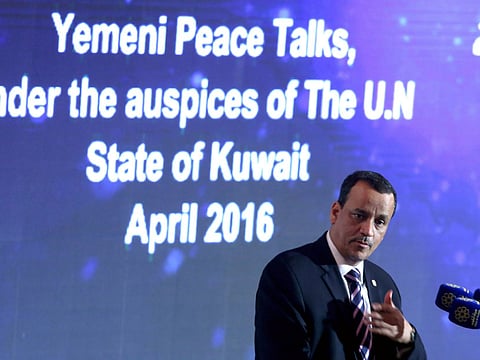UN calls for emergency economic body to prop up Yemen economy
Yemen’s foreign reserves, which stood at around $4 billion before the war, have virtually been wiped out

Kuwait: The United Nations envoy to Yemen said on Thursday he has proposed setting up an economic rescue body to save the country’s economy from collapse as peace talks drag on with no agreement yet in sight.
Esmail Ould Shaikh Ahmad did not give any details of who would sit on such a body or what it would do but said a further fall in the rial currency in the past two weeks had added to strains on Yemenis ahead of the Muslim Holy month of Ramadan.
“The situation, if it remains as it is, will lead to more inflation in prices which will reflect on the humanitarian and social situation,” Ould Shaikh Ahmad told a news conference.
“Thus, I proposed to the parties setting up an economic salvation body as soon as possible.” He was speaking in Kuwait after another round of UN-sponsored negotiations between the Iran-allied Houthis and the Saudi-backed Yemeni government to end the 14-month-old civil war that has crippled the economy and caused a humanitarian crisis.
The United Nations says most of Yemen’s 26 million people need food aid, with nearly half on the verge of famine.
Ould Shaikh Ahmad gave no figures on the drop in the value of the Yemeni rial. But residents said the currency now trades at 315 rials to the dollar compared with 215 before the war.
Yemen’s foreign reserves, which stood at around $4 billion before the war, have virtually been wiped out, with the government accusing Al Houthis, who control the capital Sana’a and all state institutions, of plundering the funds.
In February, merchants and bankers said the central bank had told traders and local banks it would cease providing credit lines for sugar and rice imports at the official exchange rate.
The UNDP said in March that households in Yemen had reported loss of access to financial assets including savings, remittances, social welfare transfers, cash transfers from family and friends, formal and informal credit and pensions.
Ould Shaikh Ahmad said restrictions on financial transfers were hurting the poor and “as a quick fix” urged the resumption of payments by the country’s Social Welfare Fund, which supports some 2 million people with payments of 3,800 rials per month.
“With the month of Ramadan approaching, we hope the parties would take practical measures to ease the burden on citizens,” Ould Shaikh Ahmad added.
Sign up for the Daily Briefing
Get the latest news and updates straight to your inbox


